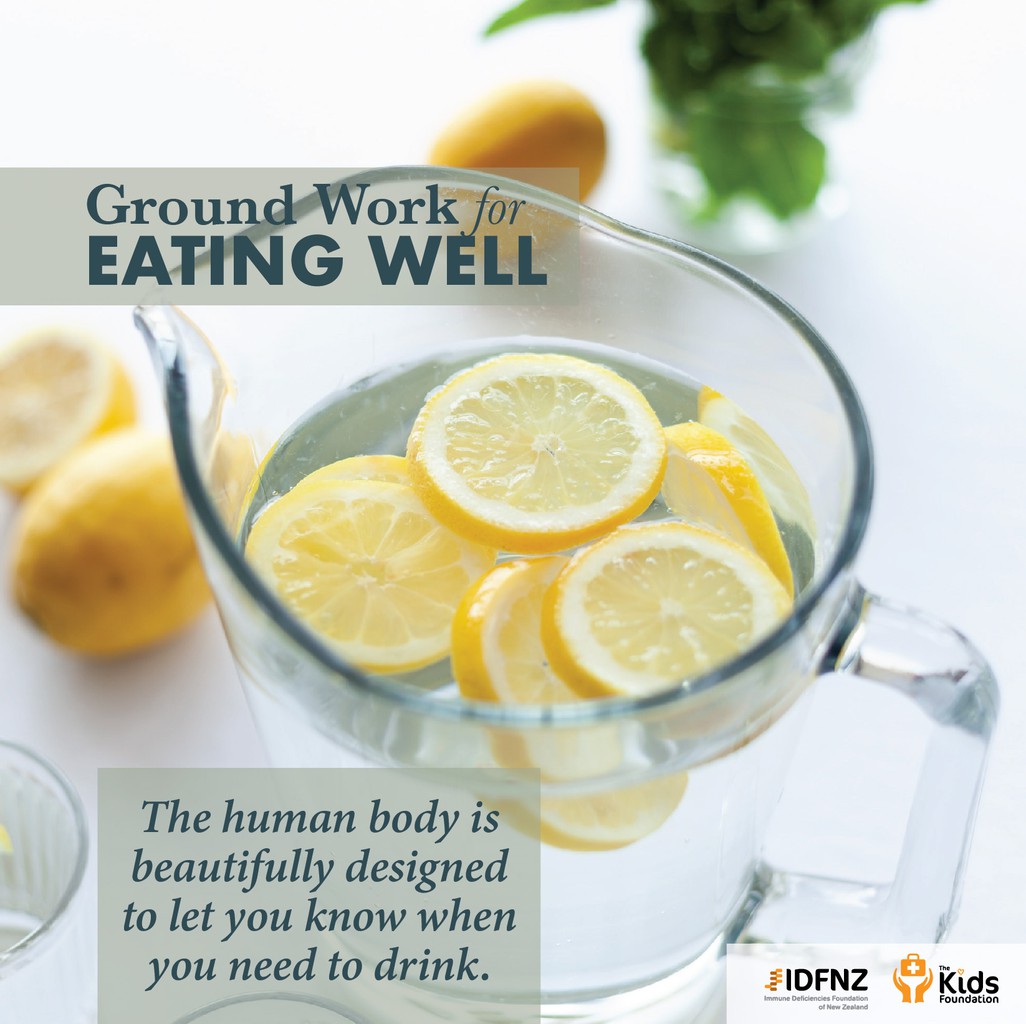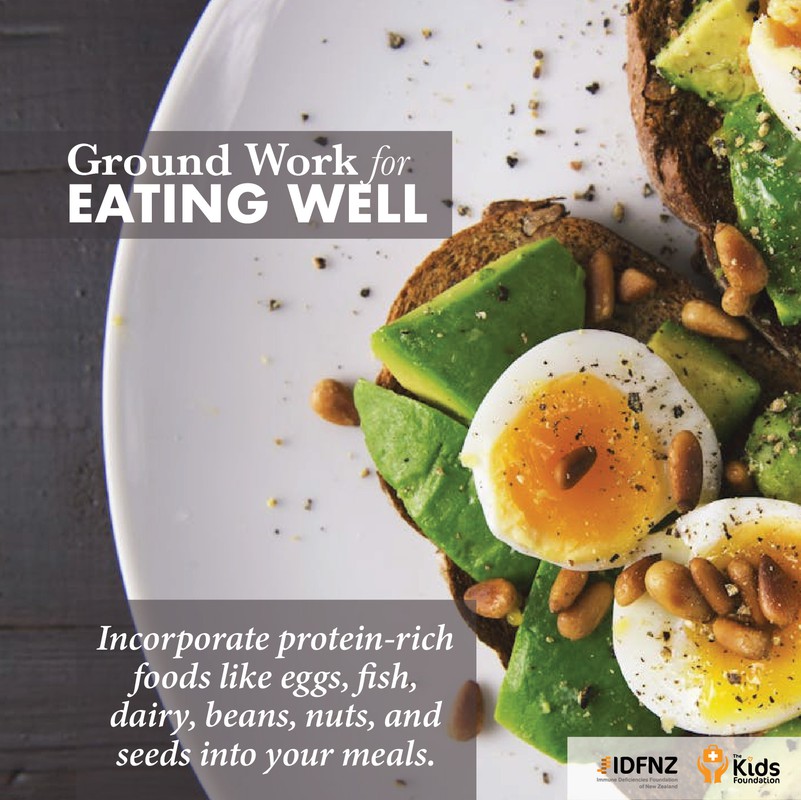Ground Work for Eating Well
Fri Dec. 6th 2024

The human body is beautifully designed to let you know when you need to drink
Limiting Portion Size
Managing portion sizes can be especially important if your condition is affected by weight management or digestion. Portion sizes are known to contribute to overeating. We tend to eat almost all of what we serve ourselves, so controlling portion sizes can help prevent overeating. Try swapping out your usual plate or bowl, or re-portioning snacks into individual portions for a smaller alternative. What’s more, you will tend to feel just as satisfied having ‘finished’ your meal. ‘Eating well’ doesn’t mean you have to give up your favourite treats either. That would make life extremely dull! Instead, opt for a smaller portion, and truly enjoy every bite.


Hydration: Water First!
Staying hydrated is crucial for overall health and can be especially helpful in managing symptoms like fatigue, joint pain, or digestive issues. The long-held belief that you need at least eight glasses of water per day, is in fact, a myth. Individual factors like body size, climate, underlying conditions and how much you sweat determine how much water you need.
The human body is beautifully designed to let you know when you need to drink. Pay attention to those cues and drink when you are thirsty. Our body functions best when it is hydrated, and it makes sense to hydrate with water, rather than sugary drinks and empty calories. Staying well hydrated also helps you to distinguish between actual hunger and thirst. Getting enough water each day improves digestion, regulates body temperature, lubricates joints, delivers vital nutrients to cells, and keeps organs functioning well – key factors when navigating a lifelong condition! It can also improve your sleep quality, cognition, and mood - those are some huge positives!
Slow Down
When life gets busy, it’s easy to rush through meals without paying attention to hunger signals. When schedules are jam-packed we can fall into the habit of scoffing down food without a second thought. Eating too quickly makes you less aware of getting full — and before you know it, you’ve overeaten.
Slowing down allows you to enjoy your food, which helps satiety. Meal satisfaction may also lead to less snacking later in the day. The food we eat is more than just nutrition! Take time to enjoy the taste, the smell, and refuse to rush it down as if it’s going to run away on you.
Taking the time to eat slowly not only improves satisfaction but also supports better digestion—which is of great benefit to anyone managing chronic health challenges.
Mind the Sugar
Many of us consume more sugar than we realize. Sugar, like salt, hides in many of the processed foods we buy. Excess sugar can negatively impact your energy levels, weight, and even your immune system. Eating too much sugar contributes to an excess of calories, which can also lead to weight gain.
The good news is that cutting down on sugar may be easier than you think! Be aware of what you are drinking, and the amount of sugar in your coffee, tea, soft drinks and juices. As mentioned earlier, water is a better choice if you’re watching your sugar intake, or try reducing a ‘2 sugars’ tea to just the one. Keep an eye on your cereals at breakfast, and the amount of sugar added on top; opt for fresh fruit or unsweetened yoghurts.
If you do have a sweet tooth, don't forbid sugar altogether; you're liable to become more focused on something that is forbidden! Aim to satisfy your sweet tooth with small amounts less regularly and learn to savour it.
Celebrate Fruits and Vegetables
For those managing a chronic condition, focusing on what to include in your diet can be more empowering than worrying about what to avoid. Fruits and vegetables are packed with vitamins, antioxidants, and nutrients that support your immune system and overall health.
Berries, broccoli, avocados and leafy greens, citrus fruits, root vegetables, carrots and apples, to name a few - fruits and vegetables are bursting with nutrients and vitamins for good health. The best thing is they don’t need to be added to, as they are also rich in their unique flavours and textures.
Keep it interesting! Experiment with cooking methods, try new herbs and spices, or snack on raw veggies with a dip. Variety not only prevents boredom but also ensures a wider range of nutrients. These nutrients will really help your body to function as well as it can, as you’re feeding it with the fuel it needs.
Prioritize Protein
Protein plays a critical role in maintaining muscle, supporting your immune system, and repairing tissues. This is especially important if your condition affects muscle strength, healing, or energy levels. Protein is the big winner on the nutrient list - adequate levels of protein is crucial to organ function, muscle and tissue growth, bone development, skin rejuvenation and even hair health! It helps make antibodies that fight off infections and keeps cells healthy.
Incorporate protein-rich foods like eggs, fish, dairy, beans, nuts, and seeds into your meals. Aiming for 10-35% of your daily calories from protein is a good general guideline—adjust as needed based on your individual health needs and doctor's recommendations.


Go at Your Own Pace
Trying to revamp your entire diet at once can feel overwhelming and unsustainable. Instead, focus on small, gradual changes that fit your lifestyle, your current health conditions and your long-term goals.
Adding even one or two of these habits over time can lead to noticeable improvements in energy, well-being, and your ability to manage your condition. Take it one step at a time, and celebrate the progress you make.
Living with a lifelong medical condition doesn’t mean sacrificing the joy of eating—it means learning how to nourish your body in ways that help you feel your best. Aim for a healthier, more vibrant you—you’re worth it!
